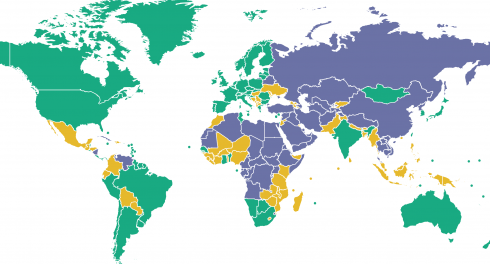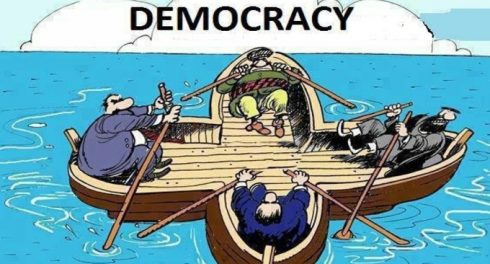This is our last Weekly for 2018. We will be back with some highlights from this year early January and resume the full Weekly on the 15th. So, stay tuned for more stories on transparency, accountability, tax governance, civic space, data and learning for better grantmaking. Thank you for taking the time to read and offer feedback. From the entire TAI team, we wish you happy holiday festivities wherever you are!
Highlights:
- Big names, big ideas = budget and taxes?
- Ownership is not the dream
- Shrinkage effects
- Imitation is the sincerest form…
- Model companies
- TAI spotlight: From shrinking civic space survey results to anti-corruption beyond 2019
In case you missed it…
Big names, big ideas = budget and taxes?

Photo: Pxhere
To “save Europe from itself,” Thomas Piketty and a host of big names this week laid out a manifesto for change. Perhaps they’ve been reading our Fiscal Futures 2040, because at its heart it’s all about budgets and taxes, namely creating a “budget for democratisation” to be financed by taxes on profits of major firms, top income earners, highest wealth owners, and carbon emissions.
Such a Europe wide fiscal regime accountable to a new, sovereign European assembly would be one potential way to revive a social contract that has been undermined by growing inequality and public perceptions of the system being rigged. Yet how do you encourage similar commitment to a social contract in an authoritarian regime? China is looking at ways to boost personal income tax collection given estimates that only 28 of 187m people are paying what they owe. How hard can you enforce without rocking the boat when the association between tax paying and government services is not a given?
Sticking with attempts to counter tax avoidance, Canada is implementing a groundbreaking law to require beneficial ownership tracking by all non-public corporations governed by the Canadian Business Corporations Act. In San Francisco, the Federal government has made it difficult for all-cash home buyers in much of the Bay Area to hide their identities from law enforcement by using shell companies. Something Germany might borrow from to clean up its real estate industry.
Want your voice and views to count on the first global tax transparency standard within the sustainability reporting industry? Then send your feedback to GRI here. The bigger challenge will be persuading firms that they should adopt the standard.
Ownership is not the dream
Returning to measures to restore faith in public sector accountability and democracy, Martin Tisné (TAI member, Luminate) argues that the concept of “data ownership” is flawed and counterproductive. Instead, we need a “strong and vigorous data-rights infrastructure.” In that absence of that technology companies continue to run amock and Elaine Kamarck worries that artificial intelligence will further disrupt democracy if we are not prepared. Are there fixes? Yes, but they are long-term – toughen government regulation, strengthen political parties, and educate the public.
Kamarck would likely agree with Julia Powles and Helen Nissenbaum that technical solutions to AI bias can be a “seductive diversion.” They argue that a preoccupation with computational details risks distracting from structural social problems.
Top reads 2018
Looking for a last-minute gift for a lover of Transparency and Accountability issues? Don’t worry we got you! Check out some of our top reads.

- The Open Revolution: New Rules for New World
- Winners Take All
- Just Giving: Why Philanthropy Is Failing Democracy and How It Can Do Better
- Dark Commerce: How a New Illicit Economy Is Threatening our Future
- Bean Counters
- New Power: How Power Works In Our Hyperconnected World
Shrinkage effects
How are funders and grantees dealing with the continued clampdown on civil society? Both are having a hard time, judging by the latest analysis from the Funders’ Initiative for Civil Society (93% surveyed funders report grantmaking has become more challenging in the past 18 months) and TAI’s latest brief offering snapshots of a survey of TAI member grantees (81% surveyed grantees reported that closing space has made their work harder.) The survey offers some of the first data on how transparency and accountability groups specifically are experiencing shrinking civic space (See more under TAI spotlight).
So how do CSOs thrive in a society where the government has a tight grip? CSOs in Tanzania have not given up. Siena Harlin details a case of how Twaweza and other CSOs in the region are navigating such a hostile political environment while keeping their commitment to the public to advocate for civic freedom.
Talking of Twaweza, you may recall from last week that their Executive Director and Open Government Partnership civil society steering committee member was not allowed to travel. The Partnership has now issued a statement requesting Tanzanian Government to intervene. Meanwhile in Ethiopia, despite some positive moves, aid workers feel silenced.
The media are even more under fire (often literally). Irex’s dashboard lets you explore data and trends about independent media in 21 Europe and Eurasia countries, but it is not a pretty picture – journalists are under attack, financial constrains are an increasing burden on editorial independence, and propaganda and disinformation continue to infiltrate news narratives. At least Time magazine recognized the journalists who are “guardians” of the truth as their collective Person of the Year.
CSOs may also get some recognition soon as EPIC-Africa and Rockefeller Foundation launch the African Civil Society Organization (CSO) Excellence Awards with an evaluation panel to be led by Mamadou Biteye, Rockefeller’s Managing Director for Africa. Meanwhile, in Liberia, the African Development Bank is engaging with CSOs to define an elaborate strategy for effective engagement in the bank’s policies, programmes, and projects.
In other related news, WhatsApp has been linked to a lot of political unrest and violence, raising questions on the spread of disinformation, privacy rights, policing and India’s changing place in the world of tech.
Want to improve your digital security, but don’t know where to start? Check out Security Planner, a new project from Citizen Lab. Just answer three basic questions to get personalized recommendations on how to improve your online safety.
Imitation is the sincerest form…
One discussion thread at the recent Funders Initiative for Civil Society donor gathering was how progressive funders might learn from the strategies of conservative funders and civil society. We might have done well to start with the Nonprofit AF top ten list of learnings – much of it seems common sense – build funding relationship on trust and partnership; offer unrestricted grants; support leaders, movements, and institutions, not specific issue areas; don’t shy away from the political.
What of measuring the impact of funder and grantee shifts? A reminder of initiatives featured at recent M&E related gatherings. First, Innovation Network offers these initial indicators to assess how social movements – or a grantee portfolio build power. Second, Root Change recently unveiled a social network analysis and feedback platform – Pando – designed to help identify diverse organizations and track relationships.
Talking of platforms, wondering where to search for coverage of effective or promising ideas and approaches—by issue, location, journalist, and success factor? Try the Solutions Story Tracker and search over 5000 stories from 156 countries on the world’s most pressing social problems.
Essential Listening
 Glenn Tiffert explores how structural and technological shifts in the global information environment are making it easier for authoritarian regimes such as China to censor and manipulate information at the source and sanitize history. Listen here.
Glenn Tiffert explores how structural and technological shifts in the global information environment are making it easier for authoritarian regimes such as China to censor and manipulate information at the source and sanitize history. Listen here.
Model companies
Transparency in the extractives industry begins with openly sharing or publishing the contracts. Kosmos Energy – an early mover on contract transparency – shares their take on why deals deserve to be public. Meanwhile, OpenOil has been studying the Kenya project of a Kosmos competitor – Tullow Oil – another in support of contract transparency. They have run a detailed fiscal model that suggests that government take is likely to remain in the low 60s% and the government’s 20% participation in the National Oil Company NOCK will not yield extra profits until the 2030s.
Pair these with the 5th edition African Governance report that examines efforts made to improve the governance of Africa’s abundant natural resources. The UNECA team point to continued failures for benefits to trickle down to populations as a whole. This is a case where ownership rights do matter, but too often those rights vested in the state are “a means of control by the political elite” further bolstered by “widespread opacity.”
TAI spotlight
Shrinking civic space survey results| TAI
TAI’s Senior Learning Officer, Alison Miranda in her blog, “Shrinking civic space and transparency, accountability, and citizen participation: Survey results from the field,” shares our survey findings and recommendations on shrinking civic space and how they can be helpful to donors and grantee organizations in their work. Download the slide deck and brief.

Human capital and social accountability | TAI
Yeukai Mukorombindo and TAI’s Edith Mecha in their blog: “Human capital and social accountability: why development advocates should care?” make a case for development advocates to engage with all necessary actors to implement accountability strategies leading to the developmental impact of open government.
On Track – Anti-corruption strategy | DFID
The UK has published its update on the first year of implementing its Anti-Corruption Strategy (2017-2022) and flags commitments to the agenda in the context of Brexit.
Building a stronger data society | Luminate Group
Gabriela Hadid explains their efforts to grow and defend a stronger and fairer data society in Latin America through investing in ILDA and R3D.
Citizen engagement for universal health coverage (UHC) | Hewlett Foundation
Patt Scheid explores four ways funders can support UHC initiatives and speaks of their 2019 strategy for advancing citizen engagement and government accountability for UHC.
Anti-Corruption Beyond 2019 |MacArthur Foundation
Kole Shettima and Erin Sines reflect on anti-corruption progress to date prospects in the run-up to the Nigerian election.
Calls: Proposals, papers, speakers and course invites
- African Civil Society Organization (CSO) Excellence Awards – December 31
- The James S. Denton Transatlantic Fellowship – January 5
- OECD and OGP Call for Innovative Open Government Cases – February 12
On the calendar
- Data on Purpose Conference – February 19-20 (Stanford, CA)
- The Role of Tax Morale in Development – January 25, 2019 (Paris, France)
- Open Data Day – March 2, 2019
- TICTec Research Conference – March 19-20, 2019 (Paris, France)
- OECD Global Anti-Corruption and Integrity Forum – March 20-21 (Paris, France)
- The CEP Conference – May 7-9, 2019 (Minneapolis, USA)
- Csv, conf, v4 – May 8-9, 2019 (Eliot Centre, Portland)
- Collective Impact Forum Convening – May 14-16, 2019 (Chicago, USA)
- 2019 Open Government Partnership Global Summit – May 29-31, 2019 (Ottawa, Canada)
- RightsCon Tunis – June 11-14, 2019 (Tunis, Tunisia)
- Global Conference on Transparency Research – June 26 – 27, 2019 (Rio de Janeiro, Brazil)
- Tax Justice Network Conference 2019 – July 2 -3, 2019 (City, University of London, UK)


